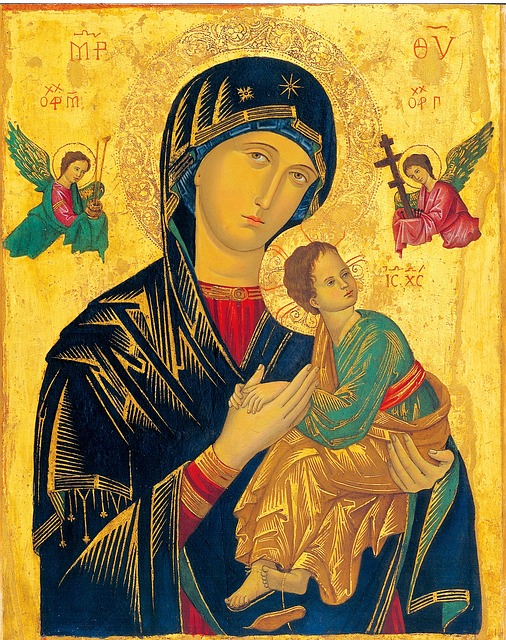Orthodox Christianity holds a unique perspective on the concept of sin and the role of Mary, the mother of Jesus. In this context, the question arises: Did Mary sin?
Table of Contents
The Role of Mary in Orthodox Christianity
Orthodox Christianity holds a special place for Mary, the mother of Jesus. She is revered as the Theotokos, the God-bearer, and her role in the faith is highly regarded. However, a question that often arises is whether Mary, being human, ever sinned. This article aims to explore this topic and shed light on the Orthodox perspective.
In Orthodox Christianity, Mary is seen as the epitome of purity and holiness. She was chosen by God to bear His Son, Jesus Christ, and her obedience and faithfulness are celebrated. Orthodox Christians believe that Mary was born without the stain of original sin, a concept known as the Immaculate Conception. This belief sets her apart from the rest of humanity, as she was preserved from the fallen nature that plagues all other human beings.
However, this does not mean that Mary was incapable of sinning. While she was free from the original sin, she still possessed free will and the ability to make choices. The Orthodox Church teaches that Mary lived a life of perfect obedience to God, never succumbing to sin. Her purity and holiness were a result of her unwavering devotion to God and her complete submission to His will.
It is important to note that the Orthodox Church does not consider Mary to be divine or equal to God. She is venerated and honored, but she is not worshipped. The focus is always on her role as the mother of Jesus and her exemplary life of faith.
Some may argue that Mary must have sinned at some point in her life, as she was human like the rest of us. However, the Orthodox Church believes that Mary’s unique role as the Theotokos set her apart. She was chosen by God for a specific purpose, and her life was guided by His grace. This divine intervention protected her from sin and allowed her to fulfill her role as the mother of Jesus without fault.
The Orthodox Church also draws upon biblical references to support their belief in Mary’s sinlessness. For example, in the Gospel of Luke, the angel Gabriel greets Mary with the words, “Hail, full of grace” (Luke 1:28). This greeting implies that Mary was already filled with God’s grace, indicating her sinless nature.
Furthermore, Orthodox Christians point to Mary’s response to the angel’s announcement as evidence of her sinlessness. When Gabriel tells her that she will conceive and bear a son, Mary responds, “Behold the maidservant of the Lord! Let it be to me according to your word” (Luke 1:38). Her immediate and complete submission to God’s will demonstrates her unwavering faith and obedience.
In conclusion, Orthodox Christianity holds that Mary, the mother of Jesus, was without sin. While she was human and possessed free will, her unique role as the Theotokos set her apart. The Orthodox Church believes that Mary’s life was guided by God’s grace, protecting her from sin and allowing her to fulfill her role as the mother of Jesus. Her purity and holiness serve as an inspiration to believers, reminding them of the importance of faith and obedience in their own lives.
Understanding the Concept of Sin in Orthodox Theology

Orthodox theology is a complex and nuanced field of study, and one of the most debated topics within it is the concept of sin. In particular, there is much discussion surrounding the question of whether Mary, the mother of Jesus, ever sinned. This article aims to shed some light on this topic and provide a better understanding of the Orthodox perspective on sin.
To begin with, it is important to note that the Orthodox Church holds Mary in the highest regard. She is venerated as the Theotokos, the Mother of God, and is considered to be the most exalted of all human beings. This reverence for Mary is rooted in the belief that she was chosen by God to bear His Son and play a crucial role in the salvation of humanity.
However, when it comes to the question of sin, the Orthodox Church teaches that Mary, like all human beings, was born with the stain of original sin. This means that she inherited the fallen nature of Adam and Eve, which includes a tendency towards sin and a separation from God. This is in line with the Orthodox understanding of the Fall and its consequences for all of humanity.
But here’s where it gets interesting. While Mary was born with original sin, the Orthodox Church teaches that she lived a life free from personal sin. This means that she never committed any sins of her own volition. This belief is based on the understanding that Mary was filled with the grace of God from the moment of her conception and was preserved from sin by His divine intervention.
This concept is often referred to as the doctrine of the Immaculate Conception, although it is important to note that the Orthodox understanding of this doctrine differs from the Roman Catholic understanding. In the Orthodox Church, the emphasis is not on Mary’s own sinlessness, but rather on the grace of God that preserved her from sin.
So, while Mary did not personally sin, she still needed a Savior. Orthodox theology teaches that Mary, like all human beings, was in need of redemption and salvation. This is because even though she did not commit personal sins, she still bore the consequences of the Fall and the fallen nature of humanity.
In this sense, Mary is seen as a model of obedience and humility. She willingly accepted the role that God had chosen for her and cooperated fully with His divine plan. Her life serves as an example of how all human beings should strive to live in accordance with God’s will and seek His grace for salvation.
In conclusion, the Orthodox understanding of sin in relation to Mary is a nuanced one. While she was born with original sin, she lived a life free from personal sin through the grace of God. This belief highlights the importance of God’s intervention in the lives of human beings and the need for His grace for salvation. Mary’s life serves as an inspiration for all believers to strive for obedience and humility in their own lives.
Examining Different Interpretations of Mary’s Sinlessness in Orthodoxy
Orthodox Did Mary Sin
When it comes to the question of whether Mary, the mother of Jesus, sinned or not, there are different interpretations within the Orthodox tradition. Some believe that Mary was sinless, while others argue that she, like all humans, was not exempt from sin. Let’s take a closer look at these different perspectives and explore the reasons behind them.
Those who believe in Mary’s sinlessness argue that she was chosen by God to be the vessel through which Jesus would enter the world. They believe that in order to be a suitable vessel for the Son of God, Mary had to be free from sin. This view is rooted in the belief that Jesus was both fully human and fully divine, and that his mother had to be pure in order to carry him.
Supporters of Mary’s sinlessness often point to the angel Gabriel’s greeting to her as evidence. In the Gospel of Luke, Gabriel addresses Mary as “full of grace.” They interpret this to mean that Mary was filled with God’s grace and therefore free from sin. They also argue that if Mary had sinned, she would not have been able to fulfill her role as the mother of Jesus, who was without sin.
On the other hand, there are those within the Orthodox tradition who believe that Mary, like all humans, was not without sin. They argue that Mary’s sinlessness would contradict the Orthodox understanding of salvation, which teaches that all humans are in need of redemption. According to this view, Mary was a faithful and righteous woman, but she was not exempt from the fallen nature of humanity.
Supporters of the belief that Mary sinned often point to the fact that she offered a sacrifice for her purification after giving birth to Jesus. In accordance with Jewish law, Mary presented herself at the temple and offered a pair of turtledoves or two young pigeons as a sin offering. This act, they argue, suggests that Mary recognized her need for purification and forgiveness.
It is important to note that both perspectives on Mary’s sinlessness or lack thereof are valid within the Orthodox tradition. The Orthodox Church does not have an official dogma on this matter, allowing room for individual interpretation and belief. This flexibility is a characteristic of Orthodoxy, which values the diversity of opinions and encourages personal exploration of faith.
Regardless of whether one believes in Mary’s sinlessness or not, it is clear that she holds a special place in the Orthodox tradition. Mary is venerated as the Theotokos, the Mother of God, and is considered a model of faith and obedience. Her role in the Incarnation, the belief that God became human in Jesus, is central to Orthodox theology and worship.
In conclusion, the question of whether Mary sinned or not is a topic of debate within the Orthodox tradition. Some believe in her sinlessness, while others argue that she, like all humans, was not without sin. Both perspectives have their reasons and are valid within the Orthodox understanding of faith. Regardless of one’s personal belief, Mary’s role as the Mother of God and her example of faith and obedience are central to Orthodox theology and worship.
Exploring the Controversy Surrounding the Question of Mary’s Sin in Orthodox Tradition
Orthodox Did Mary Sin
Exploring the Controversy Surrounding the Question of Mary’s Sin in Orthodox Tradition
Hey there! Today, let’s dive into a fascinating topic that has sparked much debate and controversy within the Orthodox tradition – did Mary, the mother of Jesus, sin? It’s a question that has puzzled theologians and believers alike for centuries, and one that continues to be discussed to this day. So, grab a cup of coffee, sit back, and let’s explore this intriguing topic together.
To understand the controversy surrounding Mary’s sin, we need to delve into the Orthodox understanding of sin itself. In Orthodox theology, sin is seen as a departure from God’s will, a turning away from the divine life. It is believed that all humans, except for Jesus Christ, have sinned and fallen short of God’s glory. This raises the question – if Mary was a human, does that mean she too sinned?
Some argue that Mary, being human, must have sinned at some point in her life. They point to the fact that she was born into a fallen world, just like the rest of us, and therefore would have been subject to the same temptations and weaknesses. After all, the Bible tells us that “all have sinned and fall short of the glory of God” (Romans 3:23). So, it would seem logical to assume that Mary, being human, would have also sinned.
However, the Orthodox tradition takes a different stance on this matter. Orthodox theologians argue that Mary, through God’s grace, was preserved from sin. They believe that she was chosen by God to be the vessel through which His Son would enter the world, and as such, she was granted a special grace that protected her from sin. This belief is known as the doctrine of the Immaculate Conception.
Now, it’s important to note that the Orthodox understanding of the Immaculate Conception differs from the Roman Catholic understanding. In the Roman Catholic Church, the Immaculate Conception refers to the belief that Mary was conceived without original sin. However, in the Orthodox tradition, the Immaculate Conception refers to the belief that Mary was preserved from personal sin throughout her life.
So, according to Orthodox theology, Mary did not sin. She lived a life of perfect obedience to God’s will, never straying from the path of righteousness. This belief is rooted in the idea that Mary’s role as the Theotokos, the Mother of God, required her to be pure and holy. After all, how could the vessel that carried the Son of God be tainted by sin?
Of course, not everyone within the Orthodox tradition agrees with this belief. Some argue that Mary, being human, must have sinned at some point, even if it was a minor sin. They believe that to deny Mary’s sinfulness is to elevate her to a status equal to that of Christ, which goes against Orthodox theology.
In the end, the question of whether Mary sinned or not remains a matter of theological debate within the Orthodox tradition. It’s a topic that continues to be explored and discussed by theologians and believers alike. Regardless of where one stands on this issue, one thing is clear – Mary holds a special place in the hearts of Orthodox Christians as the Theotokos, the Mother of God.
So, there you have it – a glimpse into the controversy surrounding the question of Mary’s sin in Orthodox tradition. It’s a complex and nuanced topic that requires careful consideration and study. Whether you believe that Mary was sinless or not, one thing is certain – her role in the story of salvation is undeniably significant.
Conclusion
In conclusion, according to Orthodox Christian beliefs, Mary, the mother of Jesus, is considered to be sinless and free from any personal sin.
For licensing reasons, we must provide the following notice: This content was created in part with the help of an AI.


